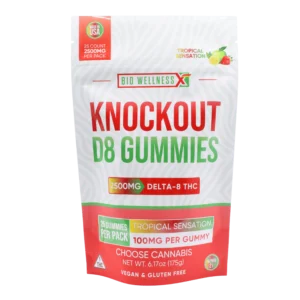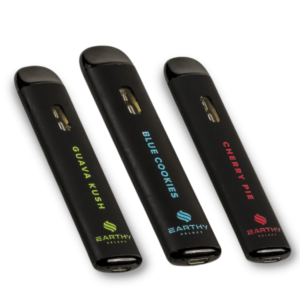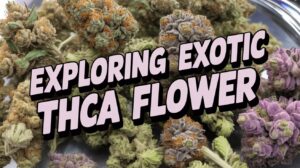key points
Delta-8 tetrahydrocannabinol (Delta-8 THC) is one of more than 100 known cannabinoids contained in the plant Cannabis sativa. Being a structural homologue of the more prevalent Delta-9 THC, Delta-8 has virtually identical molecular structure with one important difference – the placement of a double bond on carbon atom eight as opposed to nine (Razdan, 1984). This apparently small biochemical difference makes for dramatic pharmacological differences which have been the focus of scientific and commercial interest. So this all begs the question, does Delta-8 THC actually work when it comes to natural wellness? This article will reveal the truth…
What Questions Will This Article Answer?
This in-depth research article aims to answer three basic questions that arose with Delta-8’s market rise:
1. Therapeutic Efficacy: Does Delta-8 THC show measurable benefits for typical wellness uses such as stress relief, physical health, and sleep enhancement? How do its effects compare with established alternatives such as CBD, Delta-9 THC, and conventional pharmaceuticals?
2. Evidence Quality: What do recent scientific articles, including clinical trials, observational studies, and preclinical experiments, indicate about the pharmacologic effects of Delta-8? How wide is the disconnect between rigorous clinical evidence and anecdotal user feedback?
3. Risk Assessment: What are the potential health risks associated with Delta-8 consumption, especially considering the present unregulated market? How do factors such as product purity, dosage accuracy, and personal biochemistry influence safety profiles?
Delta-8 THC: The Therapeutic Potential
Interaction with the Endocannabinoid System (ECS): A Molecular Perspective
Delta-8 THC produces its effects by interacting with the body’s endogenous endocannabinoid system (ECS), a complex cell-signaling network that plays multifaceted roles in maintaining physiological homeostasis. The ECS consists of three primary components: (1) cannabinoid receptors (CB1 and CB2), (2) endogenous ligands (anandamide and 2-AG), and (3) metabolic enzymes that produce and break down these molecules.
1. Receptor Binding Dynamics
Delta-8 THC shows differential binding affinity relative to Delta-9 THC:
CB1 Receptors (Central Nervous System):
- Primarily found in the brain and spinal cord
- Delta-8 binds with roughly 30-50% reduced affinity compared to Delta-9 (PubMed)
This diminished binding accounts for its:
- Blunted psychoactivity: Reduced euphoria intensity and perceptual changes
- Decreased anxiogenic effects: Decreased amygdala fear circuit activation
- Lessened cognitive effect: Reduced disruption of working memory and executive function
CB2 Receptors (Peripheral Tissues):
- Chiefly present in immune cells, the gastrointestinal tract, and the peripheral nervous system
- Comparable binding affinity to Delta-9 (Tagen & Klumpers, 2022)
Mediates most of Delta-8’s possible therapeutic effects:
- Anti-inflammatory actions
- Immunomodulation

- Physical Relief
2. Pharmacokinetic Considerations
The changed molecular structure of Delta-8 also impacts its:
- Metabolic stability: Less prone to oxidation than Delta-9, possibly due to longer shelf life
- Penetration of the blood-brain barrier: More gradual onset but longer duration than Delta-9
- Metabolite profile: Produces distinct active metabolites that may contribute to effects
Potential Therapeutic Effects: Evidence and Mechanisms
Delta-8’s Physical-Relieving Effects
Delta-8 THC appears to produce analgesic effects through multiple physiological pathways:
Central Mechanisms:
• Delta-8 modulates sensation perception by influencing neural activity in the thalamus and somatosensory cortex
• It activates descending physical pathways in the central nervous system that help suppress signals that cause aches and discomfort
Peripheral Mechanisms:
• Through CB2 receptor activation, Delta-8 reduces production of inflammatory cytokines
Clinical Observations:
The 2021 Kruger survey (n=521) of Delta-8 users found:
• 41% of respondents reported using Delta-8 specifically for chronic physical discomfort
• 78% experienced either “moderate” or “significant” physical relief from Delta-8 use
• 62% were able to reduce or completely eliminate their use of over-the-counter medications
Limitations of Current Evidence:
• No controlled clinical trials have yet been conducted to evaluate Delta-8’s efficacy for pain indications
• The optimal dosing regimen for physical relief remains undefined in the scientific literature
• The long-term efficacy of Delta-8 for physical discomfort has not been established
Anti-Anxiety and Stress Reduction: Neurological Underpinnings
Delta-8’s anxiolytic effects may be mediated through several neurological mechanisms:
• It modulates activity in the prefrontal cortex, enhancing top-down emotional regulation
• Delta-8 appears to normalize hypothalamic-pituitary-adrenal (HPA) axis function, reducing pathological cortisol overactivation
• The compound interacts with 5-HT1A receptors in a manner similar to some SSRI antidepressants
User Reports (Kruger 2022):
• 69% of surveyed Delta-8 users reported taking it specifically for anxiety or panic symptoms
• Users described their experiences with the following characteristics:
- “Mental clarity” (reported by 54% of users)
- “Functional relaxation” (reported by 62%)
- Absence of panic symptoms (reported by 78%), compared to just 42% with Delta-9 THC
Notable Differences from Delta-9 THC:
• Delta-8 produces less amygdala hyperactivity compared to Delta-9 THC
• It demonstrates reduced likelihood of causing paradoxical anxiety at high doses
• Users exhibit more stable heart rate variability patterns, suggesting better-regulated stress responses
Appetite Stimulation & Anti-Nausea: Clinical Applications
- The 1995 Abrahamov study (n=8 pediatric oncology patients) demonstrated:
• The study achieved 100% prevention of chemotherapy-induced vomiting in all eight participants.
• Researchers observed no adverse effects during the eight-month observation period.
• Potential mechanisms of action include:
o CB1 receptor-mediated suppression of the vomiting center in the medulla oblongata
o Upregulation of ghrelin receptors in the digestive system - Consumer Reports findings:
• Delta-8 THC provides appetite enhancement without several common cannabis-related side effects:
o Only 23% of users reported experiencing compulsive “munchies”
o No significant incidence of gastrointestinal distress was noted
o The compound appears to maintain stable blood sugar regulation - Clinical Potential applications include:
• Management of cachexia (wasting syndrome)
• Appetite stimulation in geriatric patients
• Adjunctive therapy for chemotherapy patients - Neuroprotective Potential – Preclinical Evidence:
Animal studies have revealed several promising mechanisms:
• Significant oxidative stress reduction:
o 32% decrease in lipid peroxidation markers (Avraham 2004)
o Measurable increases in glutathione levels
• Enhancement of neurogenesis:
o Upregulation of brain-derived neurotrophic factor (BDNF) in the hippocampus
• Anti-excitotoxic effects through:
o Modulation of glutamate activity
o Regulation of calcium channels in neural tissue - Critical Research Gaps that remain:
• No human clinical studies have investigated neuroprotective effects
• Questions persist about blood-brain barrier penetration efficiency
• The safety profile of chronic Delta-8 THC use remains undocumented
C. Characteristics of Delta-8 vs. Other Cannabinoids

| Parameter | Delta-8 THC | Delta-9 THC | CBD |
| CB1 Affinity | Moderate | High | Negligible |
| Psychoactivity | Mild (2/10) | Strong (7/10) | None |
| Anxiety Risk | Low | Moderate-High | None |
| Physical Relief | Moderate | Strong | Mild-Moderate |
| Appetite Stimulation | Moderate | Strong | Neutral |
| Neuroprotection | Possible | Possible | Established |
This pharmacological profile makes Delta-8 a potentially useful middle-ground therapeutic agent, especially for patients who experience Delta-9 as too intoxicating or CBD as too ineffective. Yet the existing evidence base is preliminary, and more rigorous clinical investigation is needed to confirm these therapeutic potentials and determine appropriate dosing guidelines.
Claims vs. Scientific Evidence: Separating Hype from Reality
A. Anecdotal Reports & User Experiences: What Consumers Are Saying
The growing popularity of Delta-8 THC is largely driven by enthusiastic user reports that paint a picture of a functional, therapeutic cannabinoid. A comprehensive 2021 survey of 521 Delta-8 users (Kruger & Kruger) provides valuable insights into real-world experiences:
- Relaxation Without Sedation: An overwhelming 71% of users reported experiencing significant relaxation effects from Delta-8 THC. Many described this as a “calm alertness” that differs from the sometimes overwhelming sedation of Delta-9 THC or prescription anti-anxiety medications. Users frequently mention being able to maintain normal daily activities while enjoying this relaxed state.
- Mild Euphoria: 68% of respondents noted euphoric effects, but consistently characterized these as more subtle and manageable than with Delta-9 THC. The euphoria is often described as a “background glow” rather than an intense high, making it potentially more suitable for daytime use or social situations where complete sobriety is preferred.
- Physical Relief: More than half (55%) of users reported using Delta-8 specifically for relief, with many claiming effectiveness comparable to over-the-counter NSAIDs like ibuprofen. Chronic discomfort and achey patients particularly highlight Delta-8’s ability to reduce discomfort without the brain fog associated with higher doses of Delta-9 THC or opioid medications.
- Anxiety Reduction: Perhaps most strikingly, 83% of Delta-8 users reported not experiencing anxiety – a stark contrast to the 26% anxiety-free rate reported by Delta-9 THC users in comparable studies. This significant difference suggests Delta-8 may be uniquely positioned for anxiety-prone individuals who have previously had negative experiences with cannabis products.
These experimental observations, although fascinating, need to be examined cautiously because they may reflect biased self-report data and lack the control of experiments. Nonetheless, they provide useful real-life context for potential future clinical research.
Recommended products
Safety and Side Effects: Understanding the Risks
A. Known Adverse Effects: What Users Should Expect
While many consumers report positive experiences with Delta-8 THC, it’s important to understand the potential side effects that may occur, especially for new users who might not know what to expect.
- Mild Psychoactive Effects:
- Most users experience some level of psychoactive effect, though milder than traditional THC.
- Common temporary side effects include dizziness (especially when standing up quickly), dry mouth (often called “cotton mouth” by users), and general fatigue or sleepiness.
- These effects typically peak within 2-3 hours after consumption and gradually fade over the next few hours. Staying hydrated can help mitigate some of these effects.
- Overconsumption Risks:
- Edible forms of Delta-8 (like gummies or chocolates) present particular challenges because they take longer to take effect (30-90 minutes) compared to smoking or vaping (effects felt within minutes).
- Many first-time users make the mistake of taking more when they don’t feel effects immediately, which can lead to uncomfortable overconsumption.
- Symptoms of taking too much may include heightened anxiety, rapid heart rate, nausea, or feeling overly sedated. These effects are temporary but can be distressing.
- Cognitive Impacts:
- A significant majority of users (81%) report some short-term memory difficulties, particularly with recalling recent events or maintaining focus on complex tasks.
- These effects are typically mild and temporary, but important to consider when planning activities after consumption.
- The cognitive effects tend to be less severe than with Delta-9 THC, with most users reporting they can still perform routine tasks.
Delta-8 THC in Natural Wellness Practices
A. Comparison with Other Natural Remedies
When considering Delta-8 THC as part of a wellness routine, it’s helpful to compare it with other commonly used natural substances:
| Compound | Psychoactive? | Best For | Key Risks |
| Delta-8 THC | Produces a mild high | Managing anxiety and mild-to-moderate physical discomfort | Potential product contamination and inconsistent potency |
| CBD | Non-intoxicating | Reducing inflammation and seizure control | Possible interactions with certain prescription medications |
| Adaptogens (like Ashwagandha or Rhodiola) | No psychoactive effects | Helping the body manage stress and combat fatigue | Limited scientific evidence for many claimed benefits |
Key considerations when choosing between these options:
- Delta-8 offers mild mood enhancement along with its therapeutic effects
- CBD provides therapeutic benefits without any high
- Adaptogens work gradually to support overall stress resilience
Rising Popularity in the Wellness Industry: Market Dynamics and Regulatory Challenges
The Delta-8 THC commercial boom is one of the largest cannabinoid wellness industry breakthroughs since the mid-2010s CBD explosion. This trend is a direct result of policy reforms in the 2018 U.S. Farm Bill that legalized hemp and all hemp-derived substances with less than 0.3% dry weight of Delta-9 THC (Agriculture Improvement Act, 2018). Although not directly referencing Delta-8, this legislation opened a legal loophole for its production from federally compliant hemp-derived CBD.
Market research reflects astronomical growth:
- The U.S. Delta-8 market generated $2 billion in sales by 2023 (Brightfield Group, 2023)
- Diversity of products grew at an incredible pace, including:
- Edibles (gummies, chocolate, baked goods)
- Vape cartridges and concentrates
- Tinctures and sublingual sprays
- Topical creams and transdermal patches
- Consumer demographics reflect specific popularity among:
- Middle-aged professionals looking for functional relaxation
- Medical marijuana patients seeking symptom relief without strong highs
- Residents of states with no legal adult-use cannabis industry
Final Thoughts: Delta-8 and Wellness – Does It Work?
Delta-8 THC offers an interesting middle ground within cannabinoid therapeutics, with less psychoactive effects than Delta-9 THC but perhaps relief from anxiety, physical discomfort, and nausea. Existing evidence, though limited, is mostly anecdotal, and only a few clinical studies currently validate therapeutic benefits. There are major safety issues because there has been an unregulated market for the product that is riddled with product inconsistencies and possible contaminants.
The destiny of Delta-8 THC relies on closing the gap between public excitement and scientific proof. Only through thorough research and prudent regulation can we fully appreciate its role in natural well-being and ascertain whether its advantages really outweigh its disadvantages.

Legal Disclaimer:
By reading this information presented, you agree to release the author of any liability that comes from using this data. This post contains no legal advice. Claims about cannabinoids have not yet been approved by the FDA. This article was written in 2025, cannabis laws and regulations are subject to change. Read the full legal disclaimer here.
References:
- https://www.sciencedirect.com/science/article/abs/pii/002432059500194B
- https://pubmed.ncbi.nlm.nih.gov/7776837
- https://www.canada.ca/en/health-canada/services/drugs-medication/cannabis/information-medical-practitioners/information-health-care-professionals-cannabis-cannabinoids.html
- https://www.medicalnewstoday.com/articles/how-long-for-edibles-to-kick-in
- https://www.eatingwell.com/what-happens-when-you-eat-edibles-8779394
- https://www.self.com/story/cannabis-edibles
- https://www.psychologytoday.com/us/blog/healing-from-addiction/202201/4-things-to-know-about-delta-8-thc-the-new-cannabis-drug
- https://www.psu.edu/news/university-health-services/story/uhs-health-promotion-and-wellness-caution-students-delta-8-thc
- https://pubmed.ncbi.nlm.nih.gov/34980292
- https://jcannabisresearch.biomedcentral.com/articles/10.1186/s42238-021-00115-8
- https://bmcmedicine.biomedcentral.com
- https://www.bmj.com
- FDA: Regulation Cannabis
- NIH.gov: Cannabis Marijuana and Cannabinoids
- https://systematicreviewsjournal.biomedcentral.com
- National Academies
- https://proverdelabs.com/w/we-believe-in-unicorns
- https://www.fda.gov/consumers/consumer-updates/5-things-know-about-delta-8-tetrahydrocannabinol-delta-8-thc
- https://www.wilsonelser.com/publications/delta-9-thc-products-from-hemp-are-a-risk-not-worth-taking
- https://www.wthr.com/article/news/investigations/13-investigates/citing-new-test-results-indiana-prosecutors-threaten-criminal-charges-if-businesses-dont-stop-selling-delta-8-13-investigates/531-3b6132a2-b77d-4ef2-b096-e07cb72b2310
- https://www.astmcannabis.org/wp-content/uploads/2021/11/ASMT-Delta-White-Paper-Final.pdf
- https://www.stingercompliance.com/blog/selling-delta-8-thc-products-risks-for-minors
- https://www.tandfonline.com/doi/full/10.1080/01612840.2024.2372239
- https://inhalemd.com/blog/will-using-marijuana-before-bed-give-you-nightmares-or-vivid-dreams
- https://jcsm.aasm.org/doi/10.5664/jcsm.10428
- https://pubmed.ncbi.nlm.nih.gov/21167865
- https://www.med.upenn.edu/cbti/assets/user-content/documents/The%20effects%20of%20cannabinoid%20administration%20on%20sleep-a%20systematic.pdf
- https://pubmed.ncbi.nlm.nih.gov/31403110
- https://www.frontiersin.org/articles/10.3389/fpsyt.2013.00001/full
- https://onlinelibrary.wiley.com/doi/full/10.1111/j.1755-5949.2008.00071.x
- https://www.med.upenn.edu/cbti/assets/user-content/documents/s11920-017-0775-9.pdf
- https://pubmed.ncbi.nlm.nih.gov/7776837
- https://www.med.upenn.edu/cbti/assets/user-content/documents/Cannabis%2C%20Cannabinoids%2C%20and%20Sleep-a%20Review.pdf
- https://doi.org/10.1016/j.jpain.2013.08.007
- https://www.sleepfoundation.org/mental-health/anxiety-and-sleep
- https://doi.org/10.7812/TPP/18-041
- https://doi.org/10.1111/j.1476-5381.2011.01238.x
- https://www.scientificamerican.com/article/some-of-the-parts-is-marijuana-rsquo-s-ldquo-entourage-effect-rdquo-scientifically-valid
- https://mypaincenter.com/blogs/news/thc-and-meditation-guide-to-finding-inner-peace-with-cannabis
- Babalonis, S., Raup-Konsavage, W. M., Akpunonu, P. D., Balla, A., & Vrana, K. E. (2021). Δ8-THC: Legal Status, Widespread Availability, and Safety Concerns. Cannabis and Cannabinoid Research, 6(5), 362–365. https://doi.org/10.1089/can.2021.0097
- Griffin, G., Williams, S., Aung, M. M., Razdan, R. K., Martin, B. R., & Abood, M. E. (2001). Separation of cannabinoid receptor affinity and efficacy in delta-8-tetrahydrocannabinol side-chain analogues. British Journal of Pharmacology, 132(2), 525–535. https://doi.org/10.1038/sj.bjp.0703827
- Dakwar, E., & Levin, F. R. (2009). The Emerging Role of Meditation in Addressing Psychiatric Illness, with a Focus on Substance Use Disorders. Harvard Review of Psychiatry, 17(4), 254–267. https://doi.org/10.1080/10673220903149135
- https://pmc.ncbi.nlm.nih.gov/articles/PMC7531079
- https://hollyweedhemp.com/edible-dosage-chart-by-weight
- https://recovered.org/marijuana/microdosing-thc
- https://link.springer.com/article/10.1186/s42238-021-00115-8
- https://onlinelibrary.wiley.com/doi/full/10.1111/add.16142
- https://ajph.aphapublications.org/doi/abs/10.2105/AJPH.2021.306499?journalCode=ajph
- https://www.liebertpub.com/doi/abs/10.1089/can.2021.0124
FAQs About Delta-8 THC and Wellness
Hemp cultivation for Delta-8 production generally requires less water and pesticides than traditional marijuana, offering a more eco-friendly giggle to your green routine. Less impact, more mirth, Mother Earth rejoices.
Delta-8 THC may waltz with your meds, so consult healthcare maestros before adding a new partner to your pharmaceutical tango. Interaction effects can range from a mere shimmy to a full-blown boogie.
Delta-8 products should be stored in a cool, dark place to preserve their quality. Avoid heat and direct sunlight to maintain potency, lest your Delta-8 becomes as effective as a placebo lollipop.
Delta-8 THC may appear on drug tests, mimicking the detectability of its more notorious cousin, Delta-9 THC. This could lead to awkward explanations during a routine employment screening. Proceed with caution.
Navigating the intricate tapestry of international cannabis regulations can resemble a high-stakes game of “Tetrahydrocannabinolic Twister,” with each country presenting a unique contortion of legal postures regarding Delta-8 THC possession and travel.










